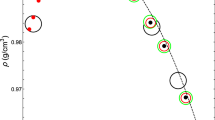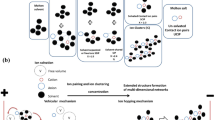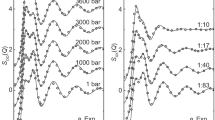Abstract
GUCKER1, on the basis of the Debye–Hückel theory, found that the apparent molar compressibility of aqueous solutions of electrolytes conforms to the relation ϕ(k 2) = ϕ0(k 2) + S k C 1/2, where ϕ(k 2) is the apparent molar compressibility at molar concentration C and ϕ0(k 2) at infinite dilution. S kis a constant. Similarly, the adiabatic compressibility was found to follow the relation β = β0 + AC + BC 3/2 (Bachem2), where β is the adiabatic compressibility at molar concentration C and β0 is that of water, while A and B are constants.
This is a preview of subscription content, access via your institution
Access options
Subscribe to this journal
Receive 51 print issues and online access
$199.00 per year
only $3.90 per issue
Buy this article
- Purchase on Springer Link
- Instant access to full article PDF
Prices may be subject to local taxes which are calculated during checkout
Similar content being viewed by others
References
Gucker, F. T., Chem. Rev., 13, 111 (1933).
Bachem, C. H., Z. Phys., 101, 541 (1936).
Gosta, A., and Bender, P., J. Amer. Chem. Soc., 63, 1085 (1941).
Author information
Authors and Affiliations
Rights and permissions
About this article
Cite this article
BHIMASENACHAR, J., SUBRAHMANYAM, S. Compressibilities of Sodium and Potassium Hydroxides. Nature 179, 627–628 (1957). https://doi.org/10.1038/179627b0
Issue Date:
DOI: https://doi.org/10.1038/179627b0
Comments
By submitting a comment you agree to abide by our Terms and Community Guidelines. If you find something abusive or that does not comply with our terms or guidelines please flag it as inappropriate.



